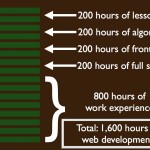 The web has seen a plethora of opportunities open up for coders, be that to learn new languages via platforms such as CodeAcademy, find new work via the various freelancing platforms or even to follow their passions with the numerous open source projects in operation.
The web has seen a plethora of opportunities open up for coders, be that to learn new languages via platforms such as CodeAcademy, find new work via the various freelancing platforms or even to follow their passions with the numerous open source projects in operation.
I wrote earlier this year about a new platform called #charity that aims to match up kind hearted developers with non-profit organizations in need of technical skills.
Charities can list their IT needs on the website project by project for free. IT volunteers are then matched to particular projects by the #charity algorithm based upon the information in their profile.
The platform provides a project manager to each project to ensure that the right people are on the right project, and also to ensure that the project runs smoothly. They provide a point of support for both parties throughout the project to aid its smooth progression.
Free Code Camp
Another project running along similar lines is Free Code Camp. Whereas #charity looked primarily for hardened coders however, Free Code Camp is happy to accept those with less experience.
The idea is that people can learn a new programming language, and then put their new found skills to the test on a number of projects for non-profit organizations.
The venture has its roots in the open source movement and currently has around 40,000 members. The ethos recommends that learners put into practice their skills a little each day, whilst also taking the courses and online challenges offered through the site.
These challenges are set by non-profit organizations that partner with the site, with the aim being to get useful work done whilst at the same time helping to embed skills in languages such as JavaScript and SQL.
What’s more, users can also gain real qualifications upon completion of their course, with students typically gaining around 800 hours of real world experience to boot, spread across four large-scale projects.
It’s a compelling concept and one that offers tangible benefits to both fledgling developers and non-profits. Find out more about Free Code Camp via the video below.
What a great project. Very cool.
This sounds like a nice way of giving people practical experience alongside their learning. That has to be a good thing.
You can quickly teach somebody to code BADLY. It's a huge mistake.
Ever wonder why software, of all things, keeps needing to be thrown away and rebuilt from the ground up? Bad analysis, bad design, bad coding.
Would you commute over a bridge designed by an engineer trained for 10 weeks? No? They why would you bet your business on one?
(I have a master's degree in computer science, but I've retired from that business so I'm not just saying this to protect my job. Over and over I have seen the damage done by bad coders.)
I'm curious about the longevity of employment for boot camp graduates. I am employed as a software developer, and I know my company would not hire a developer solely based on boot camp survival. Also, I have doubts that this is a reasonable path for a lot of people residing outside of startup territory.
I don't think a Boot Camp is the place to turn a waiter into a programmer but it is a place where you turn a VB programmer into a Ruby programmer or a Cisco engineer into a Microsoft Engineer.
As a former IT professional, I have heard the term "human capital" used more times than I care to remember. The underlying premise is that people can be used like interchangeable (and often disposable) components in a manufacturing process or financing scheme to produce a product which will probably have a fairly short life cycle. This means most of the "good" jobs discussed are targeting a 3-5 year window at best before the individual needs another reboot. In my experience companies are not willing to pay for transitional training, so plan on shelling out for continuing education and keeping your skill set and resume current.